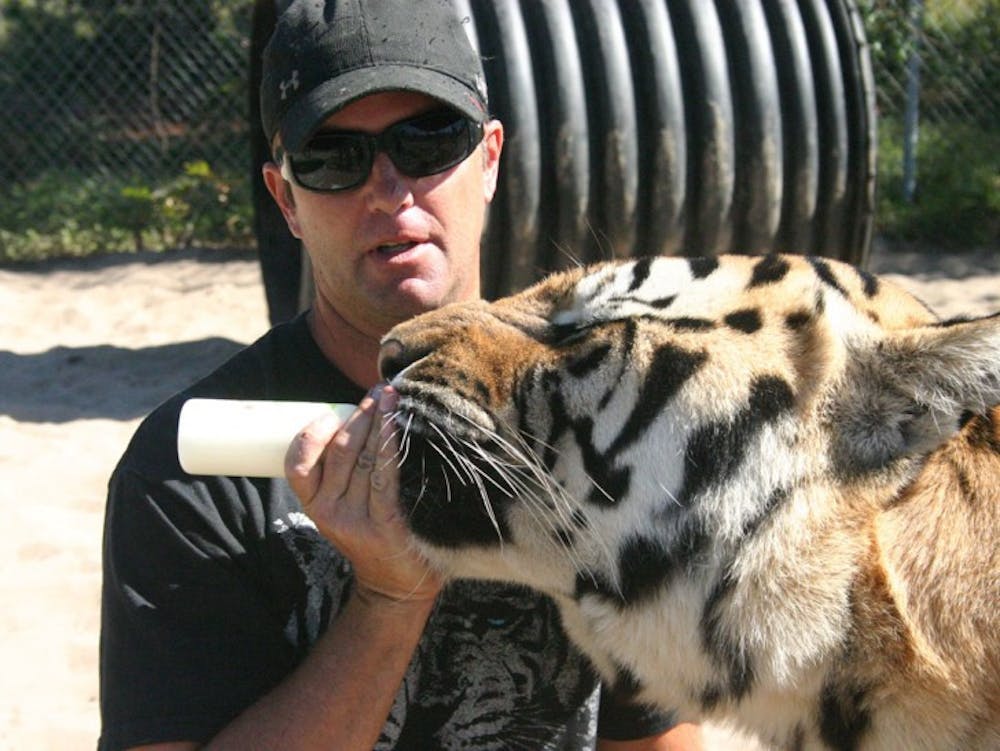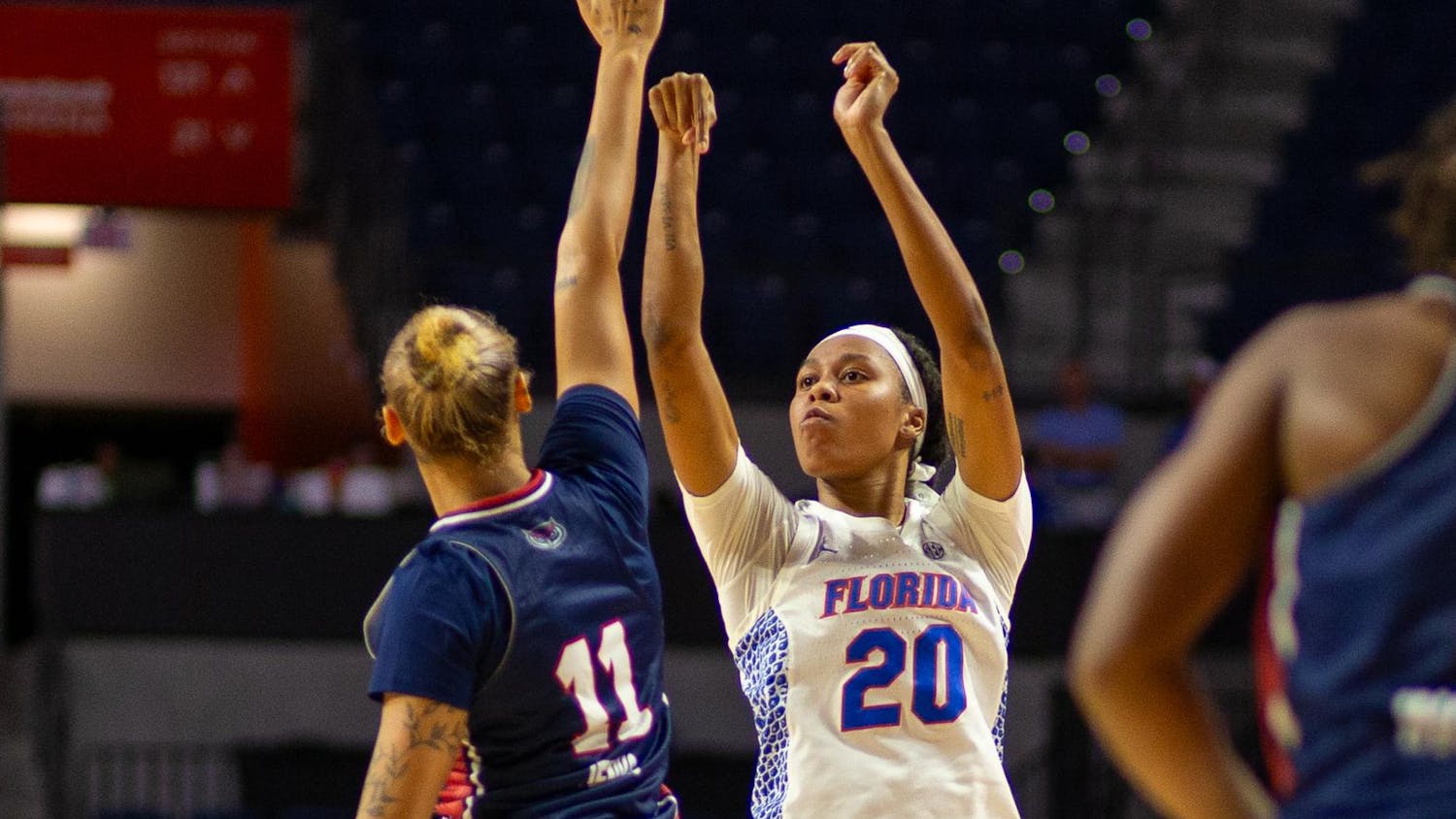Every day at about 4 a.m., Carl Bovard is awakened by his 12 cats.
As soon as they see him stir in bed, they begin to clamor for his attention.
Some of the in-house cats bounce around, from couch to countertop to entertainment center, playing and creating a ruckus. The outdoor cats, which can see directly into his bedroom, begin to pace. Fury will whistle. Sita will growl. Amira, Bali, Mohan or Sampson might give a small roar.
This is how Bovard, 40, the owner and founder of Single Vision, a cat and endangered species educational facility in Melrose, starts his morning. Bovard has two Bengal tigers, two Siberian tigers, two bobcats, three cougars, one lioness and a black leopard in his backyard.
He also owns five German shepherds, a rabbit, a tortoise, two alligators, a macaw, two Asian squirrels, two kinkajous and two house cats. In total, there are about 30 animals at the sanctuary.
His mission is to educate people about endangered species.
Bovard’s philosophy is that people don’t want to protect an animal they are afraid of. If they visit Single Vision and pet Rampage the bobcat or feed Abu the lemur, maybe they’ll understand why these animals are so special and need to be protected.
Armed with a baby bottle full of milk, Bovard entered the cats’ play area, always careful to shut and bolt the chain-link doors behind him.
“My cats are friendly,” he said.
First out of the gate was Rampage, the female bobcat, darting around to the back of the enclosure, where she teased the four tigers from the other side of the fence.
Then came Fury, the female cougar, who diverted her attention to play time, playing tug-of-war with a long branch or scaling the tree in the back corner of the enclosure.
Last came Sita, a black leopard about the size of a large dog. She slunk out quietly, green eyes flashing in the sunlight, eyeing whatever new visitor entered her domain.
She growled and crouched. She darted only a couple of feet before Bovard scooped her up in his arms.
“I do feel I have a connection with most animals,” Bovard said. “I understand them better than I understand people.”S
He graduated from Purdue University in 1995 with plans to become a veterinarian, but after working in a few clinics, he decided that career wasn’t for him. He never wanted to have to put an animal down, perform surgery or give a shot.
He took a job in animal care and animal training at SeaWorld in Orlando.
After two or three years, he applied for a position as an orca trainer but didn’t qualify. He didn’t “have the look” to perform shows for audiences, and he said his voice had too much of a Southern twang for the microphones.
After Bovard quit, he took a job at a small, private zoo in Orlando, where he soon was put in charge of taking care of all the animals, from primates to carnivores to birds. He even wrestled alligators.
The zoo shut down while he was there, but not before he met people who owned tigers.
To qualify for the licenses to privately own a tiger from the Florida Fish and Wildlife Conservation Commission and the Department of Agriculture, the applicant must have prior experience working with them.
Bovard began volunteering with those owners’ cats. When one was ready to give birth, he was put on “cub watch” and was present at their birth.
The two cubs, Bali and Amira, were born in 2005. When zoo owners discovered Bali had some vision problems, they decided they no longer wanted to keep the two sisters and offered them to Bovard.
He agreed to take them, and Single Vision was born.
He cashed in his 401(k) and used his life’s savings to buy the property in Melrose.
After the two tiger cubs came the dogs. Lemurs and more cats followed.
“I really had no intention of growing more than the two tigers I had in the beginning, but then I got calls about rescues and animals needing homes, and here we are two years later,” Bovard said.
Every Sunday, Bovard treks to the local Walmart, where he picks up about 1,400 pounds of meat for the week. That totals about $400 for food per cat. He stores the meat in six freezers in a shed by the alligator cage.
Every afternoon after playtime, Bovard defrosts whole chickens and huge briskets in the metal tub filled with water from the hose. The cats’ favorite used to be horse, but now their favorite is chicken.
They like crunching the bones, Bovard said. It’s good for them. They need the calcium.
The Single Vision cats are always playful. They aren’t mean, but they are still wild animals, and Bovard has had a couple of close calls. There is a small, thick scar on the tip of his nose where Sita scratched him before she was de-clawed.
Despite the risk, Bovard likes what he does. He hasn’t gone on vacation in six years. Though this isn’t what he originally planned to do with his life, his job is satisfying.
“I don’t work with big cats because it’s safe,” Bovard said. “I like the challenge and I like the fact that I’m working in something most people wouldn’t even think about.”
Carl Bovard feeds 2-year-old Siberian tiger Sampson at Single Vision, a cat and endangered species educational facility in Melrose.






